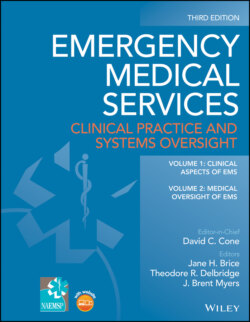Читать книгу Emergency Medical Services - Группа авторов - Страница 388
Symptomatic seizures
ОглавлениеA basic point in assessment and management is whether a seizure is secondary to some medical condition, such as electrolyte abnormalities, toxins, hypoxia, CNS infections, systemic infections, or trauma. EMS plays a key role in gathering historical information to identify likely seizure causes. A few causes of symptomatic seizures warrant particular comment.
Alcohol withdrawal seizure is a type of symptomatic seizure that usually occurs within 48 hours of cessation of drinking [19]. Usually alcohol withdrawal seizures are single and brief, but up to 30% of patients have recurrent seizures in the ED [20, 21]. Studies of patients with status epilepticus show that a significant proportion are alcohol‐related [22].
Many different toxins may cause seizures [23, 24]. Sympathomimetics, including cocaine, are perhaps the most frequently encountered. Other toxins that may cause seizures include antidepressants, antihistamines, salicylates, and anticholinergics. Isoniazid, used to treat tuberculosis, deserves specific mention because the mechanism of action of the drug requires a specific antidote: pyridoxine (vitamin B6) [25].
Seizures in association with advanced pregnancy or in the postpartum patient may represent eclampsia. Hypertension is present. Treatment involves magnesium sulfate and possibly benzodiazepines.
